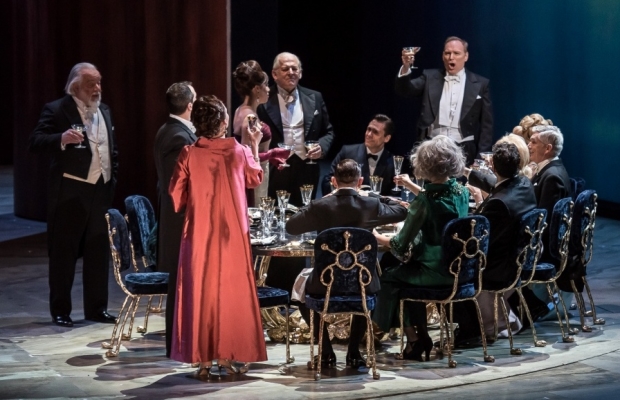Review: Charlie Parker's Yardbird (Hackney Empire)
Head down to the Hackney Empire this week and you'll likely find a theatre filled with a sense of puzzlement and unfulfilled expectation. In the audience will be mainly jazz fans, many of whom are waiting – and waiting – for the Charlie Parker music to begin, or for someone to actually play one of the horns that are brought on stage from time to time.
These are reasonable expectations, given that this jazz-infused opera is called Charlie Parker’s Yardbird, and the posters and programme show tenor Lawrence Brownlee holding a sax in a promising way.
Composer Daniel Schnyder, whose work crosses jazz and classical music, anticipated and accepted this difficulty from the start, and initially believed an opera about Parker’s achievements was a ‘nigh on impossible endeavour’.
That was until he met Brownlee, who takes the title role. And with the realisation that the bebop music invented by Parker is rooted in the American Songbook, the work began.
As well as subtle quotes from Parker’s own music to establish a link between the musical styles, Schnyder also includes a wide range of other influences, from Stravinsky and Bartók (both greatly admired by Parker) to medieval polyphonic singing. The libretto is by Bridgette A Wimberly.
The show begins at the end, with Parker, 34, lying dead on a hospital trolley, in circumstances that caused scandal for Baroness Nica Rothschild (Julie Miller) whose home he was in at the time.
Parker knows his life is over, but his spirit hovers in Birdland, the jazz club named after him, and hopes he can compose one last great piece of symphonic music before departing.
Key scenes from his life are replayed, from the cymbal thrown on the floor by drummer Jo Jones to stop him playing – a life-changing event that sent him off to practise for 10 hours a day until his technique was unsurpassable – to the bitter reproaches of his abandoned wife Rebecca, sung by the thrilling mezzo-soprano Chrystal E Williams.
The women communicate much of the emotion, with soprano Angela Brown creating the role of Addie Parker, Charlie’s mother, one of the most rounded characters and finest performances in Yardbird. She brings some welcome sass and humour to proceedings with "My Boy is King", where she thrills with pride at her son’s achievements. And finally her indomitable claim on Charlie’s dead body beats back all the wives jostling for ownership in "Next of Kin".
She also introduces the wider theme of racial segregation in "Calvary": 'This land ain’t no place for a black man child, got dreams.'
Brownlee himself is on stage for more or less the entire 90 minutes, and his engaging voice propels the show artistically. Director Ron Daniels hasn’t given him a great deal of acting to do, however, and he is a ghostly bystander for much of the action.
Conducted with vigour and precision by Clark Rundell, the ENO embrace this show, which sees the orchestra in partnership with Hackney Empire and Opera Philadelphia, which premiered Yardbird in 2015.
Ultimately, anyone who is expecting to hear Parker’s music – or would like to discover it – may be disappointed. But this is a richly detailed and passionately performed opera about a man who ‘got dreams’, and fulfilled so many of them.
Charlie Parker's Yardbird runs at Hackney Empire until 17 June.











